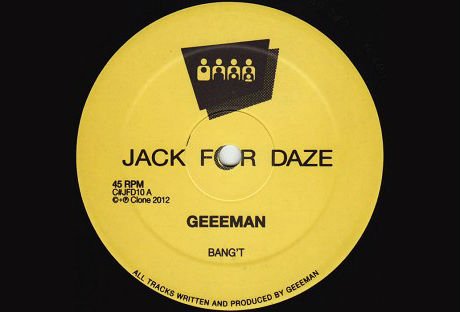We celebrate the end of the year the only way we know how: through lists, essays, and mixes. Join us as we explore the music and films that helped define the year. More from this series
In past years, our Chocolate Grinder Mixes were informal groupings of our favorite songs in a mix format, the order of which was chosen by the selected mixer. But we tried something different for 2012: the order this time around was determined by randomly drawing names from a hat, and rather than simply picking our personal favorites, writers were instructed to choose based on the previous writer’s selected track, without knowing who chose it, which track came before it (if there was one at all), and who was choosing next. Ultimately, writers could pick any track, but it had to at the very least be justified (sonically, lyrically, aesthetically, conceptually, etc.) in relation to the previous song.
With this approach — called an Exquisite Corpse, a method of art-making from the surrealists of the 20th century — we were somewhat venturing into the unknown. We could’ve had a mix composed entirely of drone songs. We could’ve had multiple songs by the same artist. Hell, we could’ve even had the same song by the same artist! That didn’t happen, but the resulting mix is still, of course, unexpected — we have Kitty Pryde and Om separated by only one track on Side A — but not knowing how the mix would turn out was part of the fun and reflects what the Exquisite Corpse is all about.
Take a listen and enjoy!
SIDE A:
Lil B - “The BasedGods Layer” (God’s Father)
Start time: 0:00 • Label: Self-Released

Sure, Lil B’s prolificacy essentially renders every listener a BasedGod dilettante, but each mixtape should be viewed not as a confounding puzzle piece, but as an invitation. Case in point: “The BasedGods Layer” is, like, his millionth song, but B’s still making introductions. While the track’s vaguely “about” power struggle, identity, sincerity, positivity, democracy, and individuality — common Lil B themes often contradicted and problematized elsewhere — some of the lyrics are straight up disconnected and illogical, unexpected and absolutely surreal, all of it backed by uncharacteristically over-the-top melodrama. And this is one of his more accessible tracks. B’s all about subconscious exploration here, throbbing, pulsating, and squirming within an indeterminate space — not to show off his flow, but to constantly search for new ones. It’s the #based way: grandeur with an absurdly serious sense of humor, truth-telling with no real foundation or precedent, mastery over nada. By picking this track, hopefully this Exquisite Corpse will lead to something equally overwhelming, instinctual, and rough. Like the feeling I get before listening to any Lil B mixtape: we’ll see how it goes I guess. NEXT.
Le1f - “Bubbles” (Dark York)
Start time: 3:55 • Label: Greedhead / Camp & Street

No, not “Beez in the Trap.” Good one! But this one’s better: if Lil B’s illusions of grandeur cease to be delusions out of sheer insistence, occupying gigabytes like a boss, Le1f’s vision absolutely falls into that same BasedWorld bubble. Because outside, a relatively good year for “gay rap” is comprised of one earnest talent who’s neither gay nor a rapper, plus one killer single that infiltrated the ballroom and YouTube with stark cryptography — both of which were legitimate forces, but neither of which much demanded we challenge our long-established ways of listening. Le1f’s out there enough to remind us how far we have to go, rapping about brunch from the lap of some shirtless Pikachu-masked dude, juking in drag (“Double time, triple time/ Girls carbon copy, closeted boyfriends wishing they could get mine”), with beats that sound like a slurry of all things warped that’ve seeped past the bouncers into mainstream pop. His fantasy is unreal, but he’s not keeping it that way.
Farrah Abraham - “After Prom” (My Teenage Dream Ended)
Start time: 6:35 • Label: Self-Released

What happens when the “bubble” pops? What happens when security shatters around you? You’re just a kid, but the night was sort of perfect: the rain, if nothing else. He kept begging, and you reluctantly gave in. Don’t tell. You broke up. He died. Two months later, you pushed out your child, alone. I made Sophia a baby book with notes […] pictures of [Derek and I] going to dances […] I want her to know that he was a happy person who liked to have fun. When you’re young, lacking the words to speak your grief or confusion, you sing songs like Ophelia’s. Your voice, attempting, becomes a disoriented tremble. You reach and pull from what you know. Throw it in a pile. Play with it on the floor. When we’re young, these are called accidents. That’s what makes them so fascinating.
Mark Van Hoen - “Holy Me” (The Revenant Diary)
Start time: 8:38 • Label: Editions Mego

There are two reasons I put Mark Van Hoen’s “Holy Me” after Farrah Abraham. The first is obvious: “Holy Me” is as heavily weighted on vocal fuckery, albeit through a different scale than “After Prom,” but with the same vigor in production “value” — as well as the ironic title comparison, manipulation of texture, tone and intent, and the sheer fact that as soon as you hear Abraham, you want to forget it (thus her kitsch/brilliance). Transition to two: “Holy Me” is the perfect memory of itself as a song. Forget catchy rhythm and chorus, “Holy Me” sears layer after layer of gorgeous anti-fluid harmony into your ears, remembered later while whistling in piecemeal.
Sean McCann / Matthew Sullivan - “An Unknown Gentleman” (Vanity Fair)
Start time: 13:26 • Label: Recital

The deconstruction of history is a fascinating idea, one touched upon in music by Mark Van Hoen’s cut-and-paste minimalism. It’s an idea furthered by the compositional chop job “An Unknown Gentleman.” Sean McCann and Matthew Sullivan, each with their own valiant reputation, throw much of it out of the window throughout the course of Vanity Fair, repurposing the shattered tendrils of classical music for a fragile new pop allegiance. Combining the bombastic overtures of Mozart and Bach with the delicate touch of Terry Riley and Glenn Gould, “An Unknown Gentleman” exists in its own vacuum where time isn’t linear, voiding the cyclical nature of history. It cuts through the black silence, building a new world order from the rubble of our past transgressions. We are no longer doomed to repeat.
Jam City - “How We Relate to the Body” (Classical Curves)
Start time: 18:04 • Label: Night Slugs

Sean McCann and Matthew Sullivan’s “An Unknown Gentleman” elucidates the affinity of sound and bodily feeling through the medium of drone; specifically, “it forces us to feel, rather than intellectualize, its sounds.” “How We Relate to the Body” by Jam City assumes a similar occupation, though distinctly advancing the necessity of movement — the virtually sexual involvement of the body and sound. Accordingly, the music is excited, composed of provocative synth stabs, hand-claps, a warm percussive energy, and an occasional whimpering vocal. Explicitly portrayed by the track’s title, “How We Relate to the Body” is not simply about the bodily relationship we have with sound, but about how this relationship is substantiated.
Jad Fair + Hifiklub + kptmichigan - “Let’s Win” (Bird House)
Start time: 23:08 • Label: Joyful Noise

Released in early January, Bird House by Jad Fair, Hifiklub, and kptmichigan was the first record in 2012 to make me exclaim “This is the greatest album of the year.” Though I have fallen in love with many records since, it has stuck with me all year long, especially the track “Let’s Win.” This track has been my New Year’s resolution, yoga mantra, psych-up anthem, and just-got-home-super-drunk-gotta-listen-to-something-dope-right-now-on-my-headphones track all rolled into one. As bimbo college kids chanted “WEEE ARRREEE YOOUUNNGGGG,” I whispered to myself, “Rubies and diamonds in our coffee cup.” Like much of Jad Fair’s colossal catalogue, the message in “Let’s Win” is blatant and his words simple, but his spontaneous, emotional, abstract way of delivering them is captivating. The wisdom that is within the sometimes senseless lyrics is something that I have dug into all year long. It’s a song made with balance: the loony vocalist preaching pure optimism, the crying synthesizers transforming into soulful slide guitars, the graceful movement from pensive positivity to cerebral celebration, and back. It was this balance (and the sensuous “Yeeaahhh” that starts it off) that led me to choose it to follow the high-energy, positively charged “How We Relate to the Body” preceding. Celebrate!
Sic Alps - “Wake Up, It’s Over” (Sic Alps)
Start time: 26:57 • Label: Drag City

“Let’s Win” confused me. Sometimes when I’m confused by something, I just want to wake up and for it to be over, which is the title of this Sic Alps song. When I wake up, I normally want to wake up to an especially slow-burning rock ‘n’ roll tune, preferably one that starts off soft and delicately guides me far away from confusion. And then, eventually, this slow-burner will turn into a big rock-monster that claws at me with its big dumb guitar riffs. Ideally, that riff will double up on itself with dirty feedback squalls (perhaps even reminiscent of those that squalled in the chorus of The Smashing Pumpkins’ “Mayonaise”). As the squalls get bigger, hopefully they won’t kill me. But if they do, that’s okay, too — I like the way they feel.
Black Dice - “Spy Vs Spy” (Mr. Impossible)
Start time: 30:06 • Label: Ribbon Music

Black Dice released an extremely fresh album in 2012, one that might have been overlooked while hiding in plain sight. After all, the band has been an insistent presence in the NY experimental music scene, putting out solid records that never really stay in any one genre. Maybe we’ve started to take that consistency for granted? “Spy Vs. Spy” could change things! It has a certain swagger about it that demands notice. The highlight: a shrieking, whiny guitar line that stands in for some androgynous glammed-out frontman. Overall, the track sounds like the work of a younger band, or at least a bunch of aging dudes who still know how to get excited about art. As for its place on our mix, I was hoping the guitar would tie things together, even though Black Dice’s aesthetic seems kinda distant from Sic Alps’. But hey, “Wake Up, It’s Over” ends with a fadeout, and going by the rules of mix-making, fadeouts cleanse the palette for whatever the fuck you want to put next, right?
Ava Mendoza - “Quit Your Unnatural Ways” [with Nick Tamburo] (Quit Your Unnatural Ways)
Start time: 34:41 • Label: Weird Forest

It’s hard to tell who’s kicking whose ass here, but my guess is that these two both walked away from the session bruised and battered in the best way possible. Love taps? Nay — these are love wallops, Mendoza’s sharp harmonic angles and pummeling rhythm up against Tamburo’s storm of cymbals. At first blush, the scorching squall of “Quit Your Unnatural Ways” has really nothing to do with Black Dice’s demented sex jam, although I suppose the guitar tone is somewhat similar to BD’s buzzy synth hooks in “Spy vs. Spy,” the two timbres sharing a certain gnarliness if you will. But the real reason this track found placement within the Exquisite Corpse was to help point out that, despite all the amazing work done with modular synths and the ever-interesting emergence of “vaporwave” as a veritable form, Mendoza’s Weird Forest release was an example of how the guitar beat all odds to rule 2012 with extreme prejudice.
Om - “State of Non-Return” (Advaitic Songs)
Start time: 38:01 • Label: Drag City

“Quit Your Unnatural Ways” presents an interesting challenge because, while there’s quite a lot of far-flung jazz chops converging all at once, the whole thing is clothed in a shroud of overdriven distortion and roomy fuzz. “State of Non-Return” by Om seemed like an excellent foil because, along with its oppressive walls of string drone and massive guitar riffage, it has a cleanly composed underbelly of gentle strings and keys. The song was the centerpiece of their 2012 album Advaitic Songs in that it typified how the stoner metal all-stars took chances and succeeded throughout the record. They stood a serious chance of alienating longtime fans with their lush, developed sounds, a serious migration from their early history of raw drone and lower-fidelity guitar roar. Om was born out of the sludge-metal ashes of Sleep, after all. Happily, much like good mixes, good music is born out of contrast. With “State of Non-Return,” as with the rest of Advaitic Songs, delicate moments only serve to emphasize the horrendous impact when Om’s wall of guitars finally, furiously erupts.
Austin Cesear - “Cloud Hall” (Cruise Forever)
Start time: 43:51 • Label: Public Information

With Austin Cesear’s “Cloud Hall,” I wanted to represent how two songs could be simultaneously different and the same from each other. While the track initially seems like an abrupt turn from the chunky riffing of Om’s “State of Non-Return,” it may become clear to the listener that they both function by boring into the mind’s eye with an unrelenting repetitive pattern. Like Om, Austin Cesear begins his composition by introducing an airy pattern. Whereas Om used lumbering riffs to enforce a heaviness over their grid, Cesear’s track gets a boost from the addition of a submerged thump. “Cloud Hall” itself is the sound of strobe lights flickering inside of a black marble fortress, beautiful and solitary.
Kitty Pryde - “Okay Cupid” (Haha, I’m Sorry)
Start time: 48:58 • Label: Self-Released

Hip-hop’s now mostly sterile enough for any suburban shopping mall, but on her track “Okay Cupid,” Claire’s Boutique employee Kitty Pryde somehow resuscitates its risk by diving straight on into the ‘burbs. There’s no fronting, as cloying giggles and crushes on binders mix with Bud Light Limes and line-snorting. Pryde shoplifts vocab like “pimp” (herself) and “shortie” (some dude she’s crushing on) to confound gender and shit, but still reminds us she’s a “princess” a few lines later. After zoning out to nothing during “Cloud Hall,” it’s refreshing to have Pryde make us focus on her focusing on herself. Malls have a lot of mirrors. Read her lip: It’s pouty.
iamamiwhoami - “idle talk” (kin)
Start time: 51:40 • Label: To Whom It May Concern / Cooperative Music

Kitty Pryde and iamamiwhoami inhabit two antipodes of viral intentionality: the former perhaps serendipitously RT’d up into The FADER’s newsfeed and beyond, the latter assiduous and measured in its initially-anonymous YouTube propagation. Both artists seek to exploit the mystery — maybe better and more simply understood as the lapses — of what can be known and dredged up on the internet vis-à-vis identity and purpose. And if Kitty Pride’s nonchalant flow about modern (everyteen?) pining glosses her compelling-if-not-yet-quite-accomplished rhyming schemes on first listen, Jonna Lee’s soaring, abstracted devotionals on kin entreat us to decide what we want to discover after multiple listens, after the digital hits the acetate and we’re left dealing with old media and our mouldering vocabularies of sequence and thematic strengths. Both songs leave me feeling older, not trusting myself to parse the authentic from the staged and the ironic from the vulnerable in “Okay Cupid” and content to lionize the Songwriting and Form of “idle talk” as correctives to some felt deficiencies in today’s EDM megaverse. You can return to each, marvel at the talent sounding the open-ended questions, reflect on the nature of collaboration in these creating these new images, and thank all parties involved that we get to witness these new distributional estuaries shape the ground beneath us.
Beach House - “Myth” (Bloom)
Start time: 56:27 • Label: Sub Pop

Is it possible to tell a story in the space between two songs? When I hear iamamiwhoami’s “idle talk,” I picture two people standing in a room lit only by a slowly flashing white light. Two people who only know how to whisper. Two people who’ve forgotten the first people they ever loved. Still, I didn’t choose “Myth” to wrap up their story. I chose “Myth” to slightly shift its direction. I chose “Myth” to remind these two what the ocean sounds like and what wind chimes sound like and what rain against metal sounds like. To remind them what cold windows feel like and what clean sheets feel like. I chose “Myth” to open and expose and leave space for more of the world.
Here is Side B of our Exquisite Corpse mix. Check out Side A here.
SIDE B:
Zammuto - “F-U-C-3PO” (Zammuto)
Start time: 0:00 • Label: Temporary Residence, Ltd.

Yeah, yeah, terrible title. And yeah, the colors chosen by ex-The Books Nick Zammuto in this track, his new band’s first illustrations (it appeared both on Zammuto’s debut EP Idiom Wind before winding up on their subsequent LP), don’t exactly come from a different crayon box than the one he clutched in The Books: there’s still pitch-shifted vocals, PVC-pipe percussion, slippery time signatures, all that good stuff. But whereas The Books occasionally embellished their rustic field-folk pastorals with simple Zen platitudes, Zammuto stokes this track with one hell of a disgusted kiss-off of a vocal (“Alone, inane, grey, confused/ Where you are/ Crawling through your pile”) and enough layers of deranged backwards loops and synth squelches to make this track sound less like the product of a carefully controlled postmodern campfire and more like the violent effluence of a blazing public burning. Bookishness, you just got your ass purged.
Demdike Stare - “Erosion of Medocrity” (Elemental)
Start time: 3:07 • Label: Modern Love

Ritualistic percussion brings Demdike Stare’s “Erosion of Mediocrity” and Zammuto’s “F U C-3PO” together to answer one simple question: what should you do about that unmotivated friend of yours, who’s constantly crashing at your place and leaving a trail of Cheetos-dust everywhere he or she comes and goes? A line in “F U C-3PO” advises taking on a supportive role (“You have lost your edge… I’ll pick it up, I’ll pick it up”), but “Erosion of Medocrity,” to the extent that one can draw thematic conclusions from music sans lyrics — as well as the track’s title — suggests something much more pessimistic. An intangible, external force is the compulsion, and it’s not necessarily towards a position of greater success. A world without mediocrity equates to a world consisting solely of extremes, and the general tone put forth by the Demdike duo alludes to polarized tension as a result. In other words, don’t be stingy with those snack foods.
Airhead - “Wait” (Wait)
Start time: 10:00 • Label: R&S

After the hypnotic dread of “Erosion of Mediocrity,” I felt something needed to follow that could gently pull listeners out of the trance Demdike Stare casts and bring them some hope. Airhead’s spacey single does that perfectly. It sounds like the sun struggling against darkness, eventually bursting through the clouds and obliterating the horrors Demdike had summoned. The former James Blake collaborator pulls vocals from multiple Karen O tracks, most notably condensing the passionate vocals of “Maps,” into a simple, single-worded plea: “wait.” The production sounds so shy at first, like someone reluctantly waking up. Patches of pitch-shifted vocals, percussion, and guitar all stumble over each other as it gains its footing. The joy that “Wait” delivers is from hearing it patiently gain confidence with each section. It’s as if the song is being built right in front of you, easing you into the gorgeous finale where everything suddenly goes supernova.
Disclosure - “Latch (feat. Sam Smith)” (“Latch” [single])
Start time: 12:38 • Label: PMR

Speaking of young London producers in the dance music game, fraternal garage-house duo Disclosure had a landmark year with their EP The Face, an unstoppable remix of Jessie Ware’s “Running,” and one of the best live electronic sets on the market. “Latch” is their least abstracted offering to date, built around a wind tunnel of whiplash snares, a stunning debut from singer Sam Smith, one irresistibly insistent vocal sample, and a polished refinement of the brothers Lawrence’s signature synth sound. As the first single from Disclosure’s forthcoming debut album, one of 2012’s most infectious singles is a promising sign for the year ahead.
Actress Pets - “Grown Men Stroking” (Actress Pets)
Start time: 16:51 • Label: AMDISCS

You can hear the cracks begin forming in “Latch.” A threatening crackle just below the throbbing bass. The foundation completely falls away in “Grown Men Stroking.” Sparks of melody fail to penetrate the surface. Standing on the edge looking down, you can see the whirlpool of loose wires and sound waves. There is probably an infinite amount of dance music down there. Is this the speakers blowing the fuse in slow motion? The swan song of dying batteries? What happens to electronic music when all of our electronics die? The world may not actually be ending this year, but no one told Actress Pets.
Geeeman - “Bang’t” (“Bang’t” 12-inch)
Start time: 19:45 • Label: Clone Jack For Daze

Whoever went before me was perfectly considerate with Actress Pets’ “Grown Men Stroking;” resuming on a wind-down meant I could take the mix in any direction. I opted to up the energy levels with some irresistible Dutch smack from Rotterdammer Gert-Jan Bijl, one of 2012’s defining house smashes, played out just about everywhere by just about everyone. I suppose this counts as selfishness: I appear to have painted someone into a corner. No grudges, I hope.
Lawrence Arabia - “The Bisexual” (The Sparrow)
Start time: 26:05 • Label: Bella Union

On the surface level, I picked “The Bisexual” from New Zealander James Milne’s lush third album as Lawrence Arabia for the obvious reason: that bisexuals do “lots of bangin’” (as had been repeated in the previous “Bang’t” track). Yet, on a deeper level, I felt the thoughtfully arranged Serge Gainsbourg meets Scott Walker orchestral pop melodrama would provide an understated yet composed counterpoint to the aesthetic repetition of the former Geeeman house number. Both took an old school approach to their forms, but from different eras: the early 90s rave movement contrasted with late-60s baroque pop.
Actually - “Me and My Late Night Guys” (Actually)
Start time: 30:29 • Label: Self-Released

From one playful, sardonic take on sexual identity to another. Los Angeles video artist and pinup girl Ashley Huizenga took conceptual fame whoredom to new, hyper-saturated heights this year with the release of her proper debut album, Actually. The breathy pop chanteuse shamelessly luxuriates in a pansexual fantasy space resembling Second Life as reprogrammed by The Scarlet Woman from Kenneth Anger’s Inauguration of the Pleasure Dome. The video for “Me and My Late Night Guys” is expressly erotic while maintaining a complex sense of self-critique in its employment of visual signs related to class, gender, and sexuality. All is not as it seems in this garish, masturbatory daymare of a Tinseltown orgy unstuck in time.
Grimes - “Genesis” (Visions)
Start time: 33:54 • Label: 4AD/Arbutus

You know what? Actually and her late-night guys can go fuck off. They don’t get it. They all think people are easy to read, and right and wrong is obvious. No. No, it’s not. You and I know this too well. There are so many who think themselves better, supposedly enlightened, all because they know some great big thing. But you know there’s more to it than that, and you let yourself go, because some things we just cannot understand except through experience. “Oh, heart/ And then it falls/ And then I fall/ And then I know.” How many times have we fucked up? We learn, though. They still have not a single clue, Because they forget one thing: It’s all different. Some people just need to learn to shut the fuck up.
Momus - “Shunned” (Bibliotek)
Start time: 39:15 • Label: Darla

The lament of one castout is an appropriate aftermath to Genesis, as a story of exile. The downward trajectory of Grimes’ theme of (the) Fall continues in Momus’ resigned despair, set in a too-familiar desecrated garden: “I’ll read a book, I’ll watch the wall/ Breathing exhaust/ While exhausted sparrows fall.” Here, the Tender Pervert reverts to sincerity, though in his work the confessional can never be taken at face value. But “Shunned,” inasmuch as it merges performative emotion with a restless experimental ethos, can be considered characteristic. A desolate dignity emerges from musical bareness that works through repetition, a chanson-style melodrama that immediately refuses itself. But that bareness, too, self-refuses, tarrying among quiet cacophonies in which the environmental exists in tension with the operatic. The little losses of love so familiar from pop tropes are subsumed in a broader dramatization of the post-Marxist imaginary: the system-as-big-Other is irresistible, while ‘I’ am infinitely disposable.
Howlround - “Part 2 - The Resonating Stairwell” (The Ghosts Of Bush)
Start time: 43:27 • Label: The Fog Signals

The genius of “Shunned” is in the way it conveys an arresting sense of space. Its video drags you through a cold, empty cave, as idiosyncratic noises fire off in a random fashion as if from altogether different songs played in the distance. This chilly atmosphere is the perfect canvas for Momus to paint his morbid reflections, evoking, as one YouTube commenter puts it, a “Momus swan-song.” In a similar way, Howlround uses a gripping sense of space to convey its own purpose. The whole record is constructed from night recordings of Bush House, home to the BBC World Service for 70 years until its relocation this year. Distant creaks and drones play against other muted noises to draw you into a vast, empty space that still sings with a life of its own. The result is that the whole album seems like a swan-song to the space itself, the final eerie gasps of a building whose purpose has been gradually eroded and eventually lost.
Mirrorring - “Fell Sound” (Foreign Body)
Start time: 47:36 • Label: Kranky

Where Howlround intones whispers of the past, Mirrorring are ably rushing up to meet those ghosts and take a twirl. Northwest artisanal gloom weavers Liz Harris and Jesy Fortino keep their ears close to all surfaces, so that their limbs and voices practically spill the murky tonal frequencies of the vast unknown surrounding us in every direction. Living and dead, each measure vibrates against the stultifyingly still absoluteness of each body. Every note has lost its way, and every gasp takes in water, gradually flooding the whole scene. Each keening phantom is imbibed with the clammy cold comforts of corrective hindsight. Overwhelmed is okay, so long as we’re whelmed, whelmed, whelmed as our blind curve universe immeasurably convulses.
Mi Ami - “Horns” (Decade)
Start time: 52:46 • Label: 100% Silk

Being an avid fan of both Tiny Vipers and Grouper, I found the Mirrorring collaboration to be an extraordinary immersion into the darker realms that both Liz Harris and Jesy Fortino convey elsewhere. It’s not necessarily fitting that I should pair the coarseness of Foreign Body’s opening track with the camp neo-house contortions of Mi Ami, but as “Fell Sound” drifts away into a gorgeous blurring fadeout complete with acoustic guitar strings, it seemed like the perfect opportunity to inject something tactical. “Horns” begins with gliding synths and distant murmuring before misty percussion kicks in and propels Daniel Martin-McCormick’s spastic no-wave vocals across the unwavering heights that made Decade one of my favorite electronic albums of the year. It’s an unlikely combination of styles, but one that gorges on the work of two side projects that are undisputed personal highlights of 2012.
Action Bronson - “9-24-11” (Blue Chips)
Start time: 61:10 • Label: Fool’s Gold

Action Bronson earns this spot on our list through the powerful virtue of contrast. Not only does “9-24-11” represent a dimensional warp from preceding track Mi Ami’s “Horns,” it represents a musical territory in 2012 that, as far as I heard, Bronson and his producer Party Supplies ruled alone. Any explanation I can offer would probably seem pedestrian and redundant, because it all comes back to the Dean Martin sample. The looped backing vocals seem like they’d get abrasive after a dozen listens or so, but for me, the track still sings despite heavy rotation. Action Bronson’s triple error-mulligan moments are more curios than liabilities. But most importantly, the sample’s cadence, the way the harmony resolves before the song’s last verse, is one of the most musically poignant moments of the year, lofting Bronson from characteristic comic vulgarity to an instant of profound urban pathos.
Jason Lescalleet - “The Future Belongs to No One” (Songs About Nothing)
Start time: 65:07 • Label: erstwhile
 Photo credit: Non Event
Photo credit: Non Event
The very idea of having to choose the final track of our exquisite corpse is utterly perverse to me. I know absolutely nothing about the first 28 tracks, and the one grain of information I do know of is a rap track that I only first heard upon receiving this assignment. Although I can speculate about macro-level mix information through this track (Did another hip-hop track precede it? Is the mix beat-heavy? Does the rest of the mix sample Dean Martin or exhibit a similarly confused playfulness?), I’m lost in the end. No matter what I choose, there’s a strong chance that it will betray some theme laid out earlier in the set. Everything I choose is no good, the future of this mix doesn’t belong to me, nor Jason Lescalleet.

We celebrate the end of the year the only way we know how: through lists, essays, and mixes. Join us as we explore the music and films that helped define the year. More from this series
